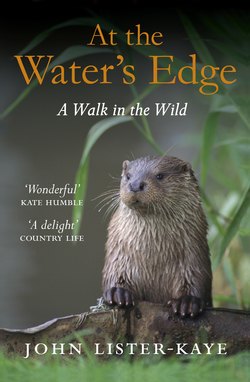Читать книгу At the Water's Edge - John Lister-Kaye - Страница 12
На сайте Литреса книга снята с продажи.
Оглавление5
Dawn
. . . and then, in that utter clearness of the imminent dawn, while Nature, flushed with fullness of incredible colour, seemed to hold her breath for the event, he looked in the very eyes of the Friend and Helper.
– Kenneth Grahame, The Wind in the Willows
June was once described to me as ‘a few sleepless weeks charged with all the desperate, procreative amperage of spring’. It is certainly true that at these northern latitudes the long hours of spring daylight banish night to a brief, twilit apology. The sun’s last stain trails below the horizon and emerges again an hour later with another name – dawn.
Dawn is the moment that sets it all a-spinning, sounds bugles, lights fuses, shifts moods and tugs insistently at the leashes of biorhythms. Dawn fires energy into red corpuscles and chloroplasts, explodes buds, fluffs out breasts, swells syrinxes with song, stretches out the incubating osprey’s wings, whispers the shadowy red deer hinds back to the moor, charges the flick in the squirrel’s tail, wafts the tawny owl back to his roost and, throwing a last glance over his shoulder, the reluctant fox vanishes into the damp darkness of his fetid lair. Dawn is a new look, another chance to tilt at the windmills of fate; it is its own alpha and omega, the exuberant manifest of hopes unknown. Dawn is the poetry of the incipient day.
By the middle of our June nocturnality really no longer exists. Bats are forced to hawk their insects in sunlight, foxes stroll and badgers scratch in the strong evening sun; both forage in broad daylight for much of what in that other long, introspective season from August right through to May is commonly called the night. Confused, our tawny owls hoot at noon.
And the desperate, procreative amperage? Yes, it is the season of heady affliction, of a certain brand of solar madness both comic and tragic at the same time. Perhaps it was what touched Shakespeare when he conceived the tangled plot of A Midsummer Night’s Dream, bright dawns dragging him from his bed to take up quill and invent characters like Bottom, the clumsy victim of Puck the prankster, and the sun coming up to end the comic fantasy of the night in the forest. John Masefield had evidently been there too when, eulogising ‘Beauty’, the first lines to flood in were, ‘I have seen dawn and sunset on moors and windy hills coming in solemn beauty like slow old tunes of Spain.’ A Highland spring dawn is also charged with urgency and an impending sense of ephemerality – if you don’t pay attention you’ll miss it. Those of us caught up in this headlong rush at spring know all too well that it is finger-snap brief and that the perverse laws of delight dictate that it has to be repaid ten times over later on. Our ebullient vernal daylight may surge to twenty-three hours in June, but all too soon the darkness and the cloying cold will systematically close us down once more.
For those who choose to keep their windows shut, who draw their curtains tight and ignore June’s electricity, life can pursue its drab routines, but I have never been able to block out ‘the utter clearness of the imminent dawn’ and those first strains of birdsong, whatever time or season it is, nor to remain asleep in the light. My bedside window is flung wide all year round. I welcome all comers – rainstorm, wind, blizzard and searing frosts that slide in and grip the tumbler of water at my side, as well as the great, coal and blue tits, dunnocks and robins that venture in, all unsuspecting and unaware of human presence. I am regularly greeted by tiny, fluttering wings and their not-so-welcome offerings on the bed head above my face.
On the rare occasions I find myself in an airport hotel room, trapped in an air-conditioned, double-glazed box without any means of opening a window, I become a caged animal, stressed and despondent so that all I want to do is curl up and sleep. I have a real need to feel the night air on my face, to spiral skyward with the barometer and relish the flow of negative ions lifting me out of gloom. At home I love to raise an ear at the fox’s rough curse; I smile at the red deer hind’s deep-throated, tetchy cough echoing from the woods behind the house. I wake with the dawn. There is something magnetic about first light, a primal, perhaps genetic connection with our Cro-Magnon ancestors, who had to rise before the sun to hunt. If I stay in bed I feel guilty, somehow letting them down. So, if the weather is fair, I slip out and head off towards the loch. It is always fresh and exciting. At 3.30 a.m. the June air has a tang to it, like cologne; whether the sun is out or not, it is charged.
